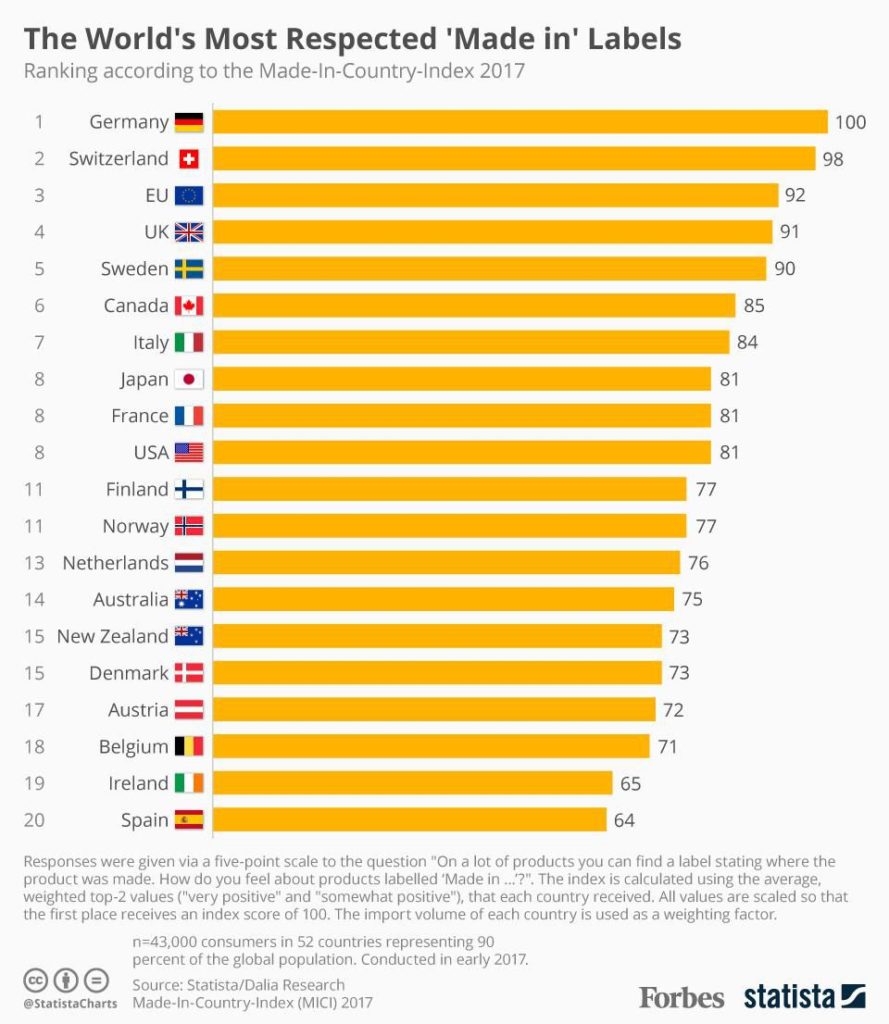
Industry’s many hidden champions, top engineers, and a highly skilled workforce are the success factors behind the magic of “made in Germany.”
The stakes are high when you ask somebody what “made in Germany” means and he answers with “high-quality products that last forever,” followed by a list of carmakers, machinery, power tools, etc.
Yes, people’s perceptions of “Made in Germany” are very positive and confirmed in a 2017 survey by Statista/Dalia Research. Over 43,000 people from 52 countries placed Germany at the top of the Made-In-Country Index. The United States took an honorable 8th place, together with France and Japan.

But, is the magic of “Made in Germany” myth or reality?
The magic of Made in Germany
Brands like Lufthansa or BMW are symbols for German top quality but also representative of many smaller German companies that are market leaders in their field. The term “hidden champions” was coined by author Hermann Simon in the book Hidden champions: lessons from 500 of the world’s best unknown companies.
The book questioned why Germany, a rather small country, has kept its position of number one in export surplus forever. The author researched 500 German companies and found which success factors these hidden champions share: they are mid-size companies, often based in smaller towns, and produce high-specialized niche products for export markets. They are single-product manufacturers whose competitive advantage lies in high performance and not in low cost.
Another finding of Simon’s is more cultural: these SMEs value conservative values like hard work, low tolerance for underperformance, and strong employee loyalty.
Why are German companies able to maintain high-quality production standards?
For years, Germany has had a successful professional education system: the apprenticeship training program (or Lehre in German). “Every year, about half a million young Germans enter the workforce through these programs,” stated NPR in this January 4 article.
With a share of 23% in the national economy, German manufacturers need a skilled workforce. During their apprenticeship training program, students will spend half of their time in a vocation school (Berufsschule) and the other half at the company where they’re employed. They are even paid, even if it’s only a small wage.
During my professional life in Germany, I’ve observed and even coached many trainees, (or Lehrling) as Lehre are common in all kind of business as hospitals, insurance companies or banks, hairdressers, etc.
A cultural advantage of “Made in Germany”
At the beginning of the 20th century, the German government was aware that England and the US were ahead in their efforts of industrial mass production. In order to keep up, they sponsored the Werkbund, an association of craftsmen, architects, and industrialists with the aim to develop better products that could be marketed with the “Made in Germany” label.
History aside, many Germans dislike halfway solutions and low performance and expect high performance in whatever they buy. Consider also that Germany is a high-wage country that certainly supports the purchase of more expensive (i.e. higher-quality) products.
At the same time, German manufacturers can’t compete today with lower-wage countries. Instead, they work hard at developing and maintaining close relations with their clients to whom they sell premium goods at a higher price.
Of course, Germany also produces mediocre products, and a “Made in Germany” label is not always a guarantee of top quality. I just bought a new vacuum from the German brand Severin. What a disappointment. It hasn’t broken yet, and to be completely honest it may never break, but it doesn’t have enough power to vacuum properly.
The magic of “Made in Germany” comes from hard work in developing innovative solutions and maintaining high-quality standards.
That’s not really magical but highly efficient, I’d say, and I should have bought a Miele vacuum…




